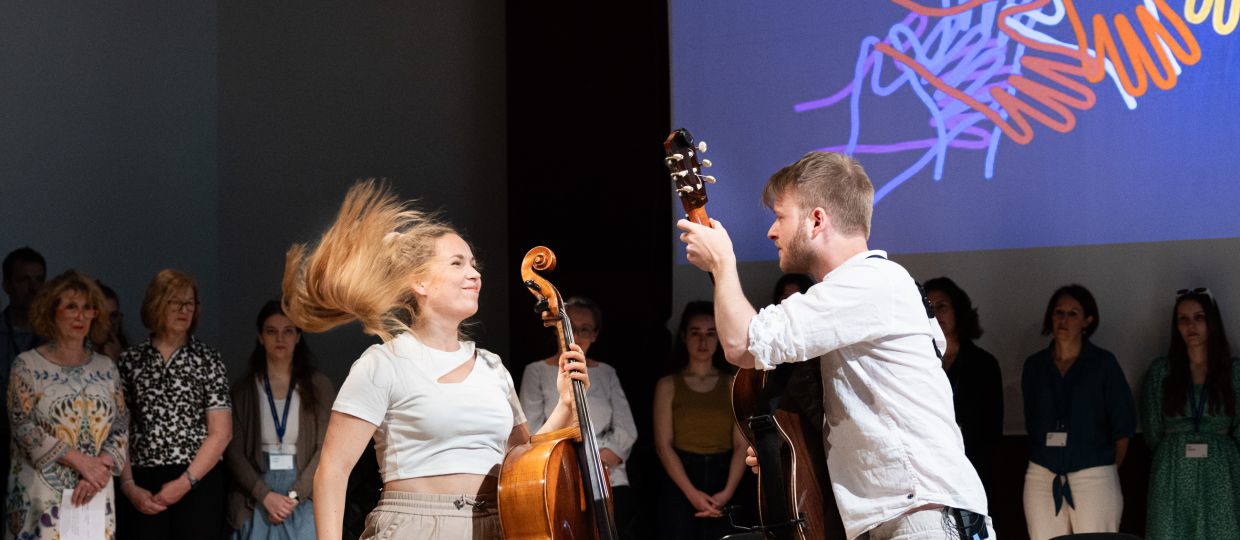Imagine, for a brief moment, that you could use music and music mediation to change our society for the better. How would you go about it? With an opera project open to everybody? With musical encounters between young adults in a remote alpine valley in Ticino? By working with inmates of a juvenile detention centre, or by putting on a youth opera about an “escape room” experience for the homeless and those searching for a home? With Bach for terminally ill patients in hospice care, or with an “improphony” as a new concert format?
All of these ideas and their realisation were addressed at the international conference Turning Social – On the Social-Transformative Potential of Music Mediation, which took place at the mdw on 15 and 16 June and was organised by Sarah Chaker of the Department of Music Sociology together with Axel Petri-Preis of the Department of Music Education Research, Music Didactics and Elementary Music Education (IMP). Furthermore, a range of topics including cultural democracy, the decolonialisation of knowledge pertaining to music mediation, artistic citizenship, and the future of university-level training and further training for musicians and music mediators were contemplated and discussed in lectures, workshops, and both panel and round table discussion formats.
This conference began with a performance by the duo David e Mia (consisting of mdw students Maike Clemens and David Volkmer), an opportunity for participants to directly sense music’s communicative power and its ability to spark encounters.
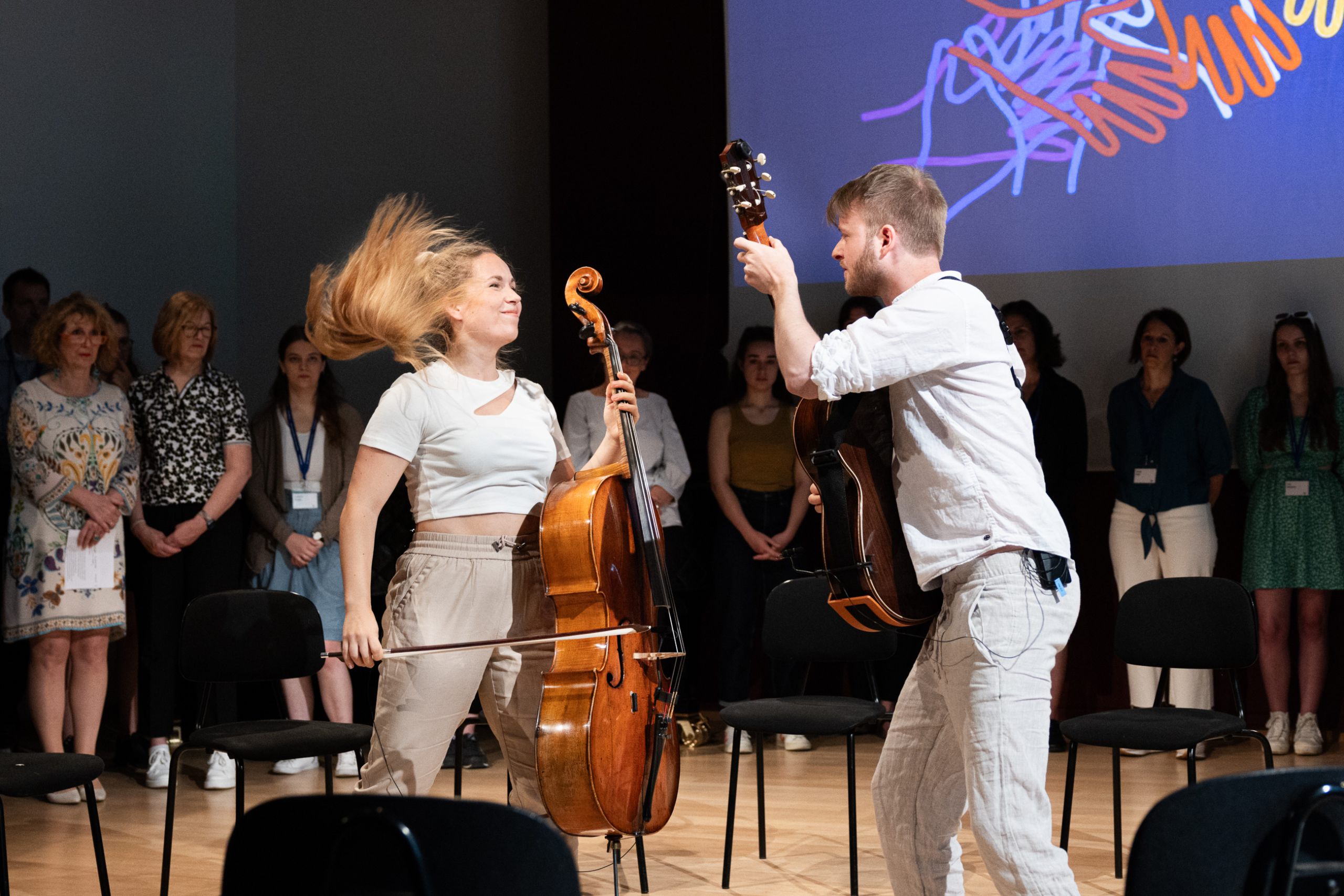
In their words of greeting, mdw Rector Ulrike Sych and Arne Forke, an aide to Vienna’s Executive City Councillor for Culture Veronica Kaup-Hasler, emphasised music mediation’s exceptional power—a power whose potential is nowhere near exhausted since music can be targeted to encourage encounters between people and thereby catalyse processes of societal change.
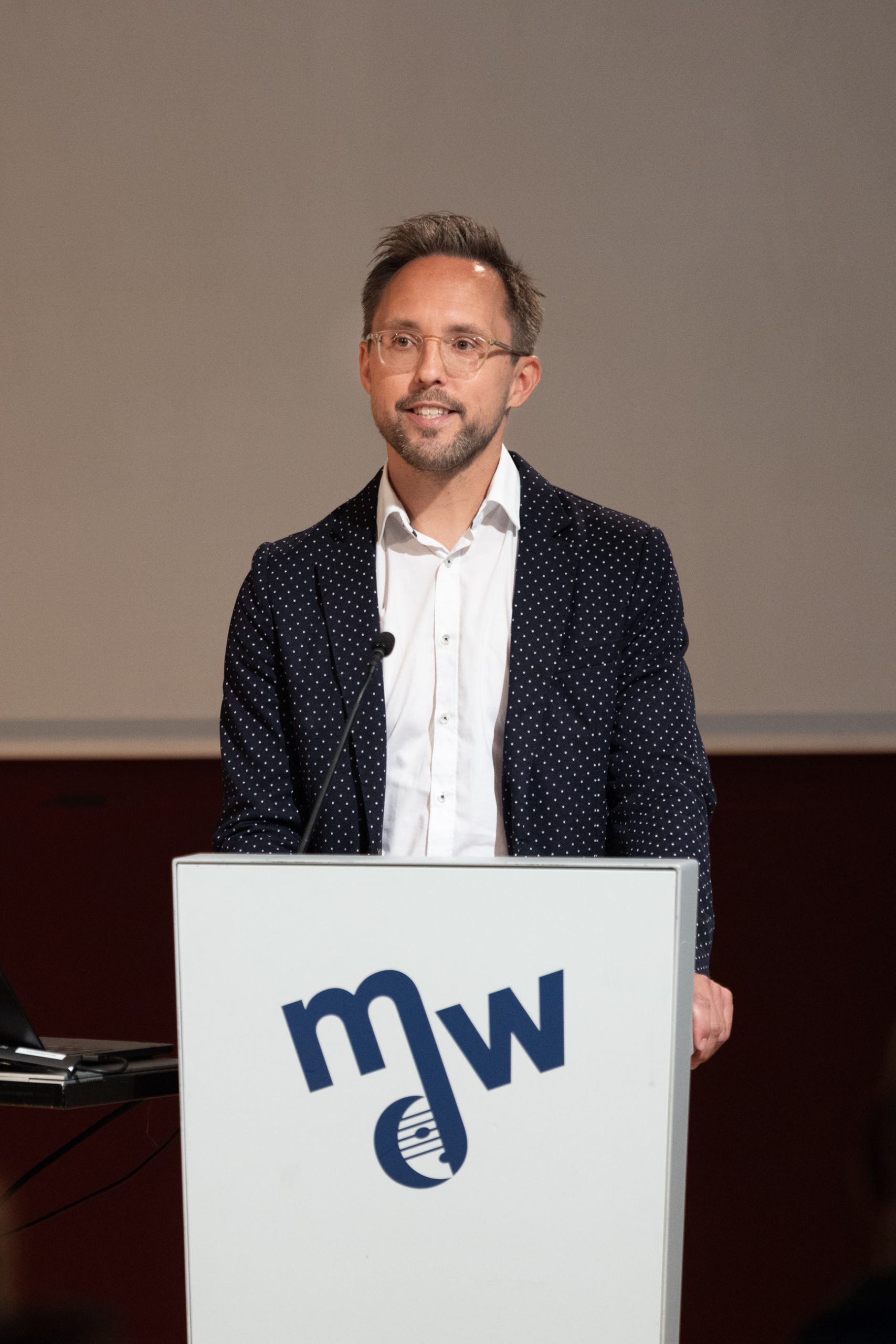
Organisers Sarah Chaker and Axel Petri-Preis then kicked off the conference with questions that were to be answered in illuminating ways and provide new impulses over the two days that followed. They zeroed in on questions as to social aspects’ situatedness in music and music mediation’s responsibility (such as regarding processes of decolonialisation in a pluralistic society), rendering audible unheard material and people, and the general issue of the responsibility borne by our society’s members toward one another and toward common spaces.
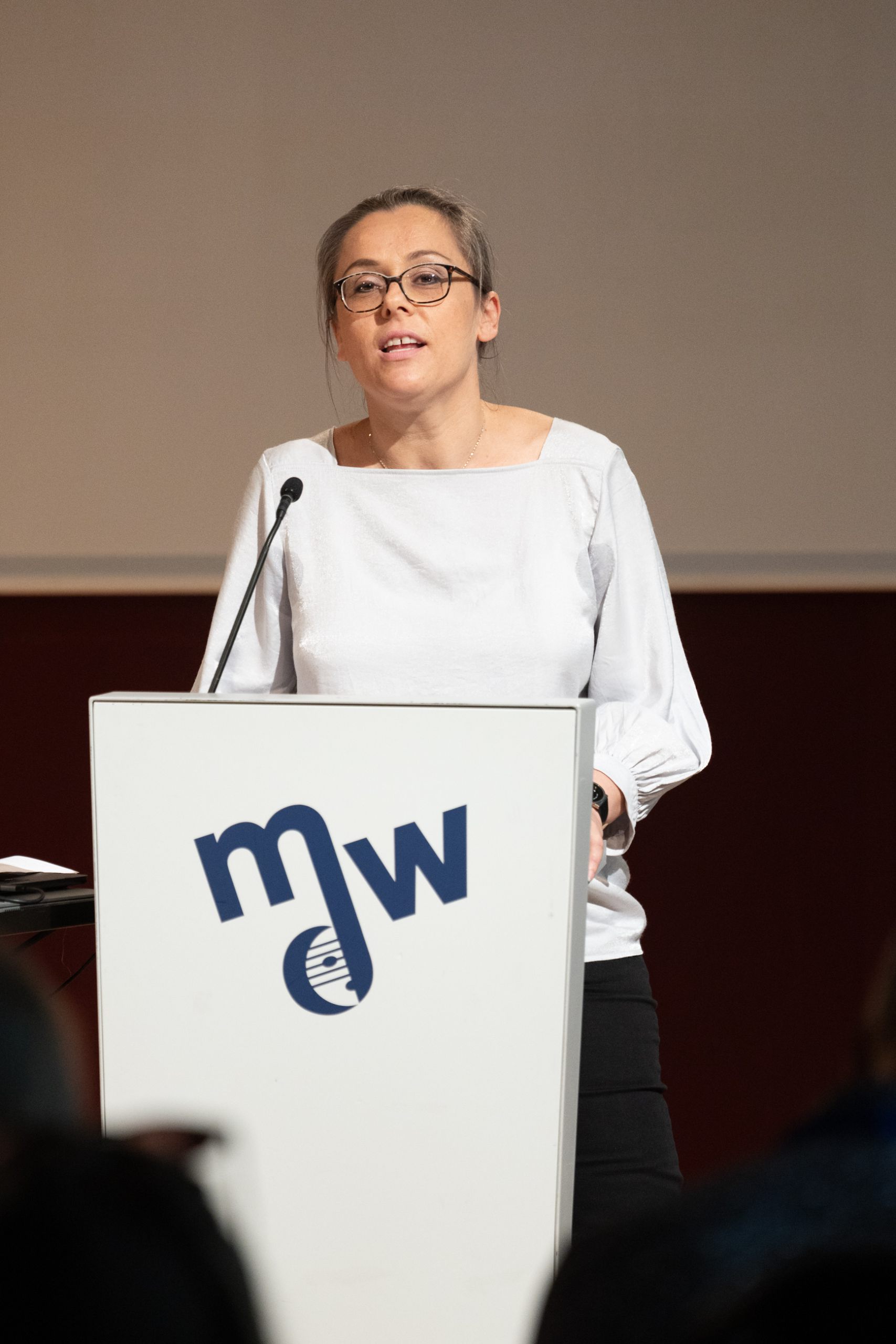
The conference’s first keynote, delivered by François Matarasso, marked the outset of a multifaceted and intriguing interprofessional voyage of discovery, a veritable “Odyssey” in the following 13 scenes. So come along—Ithaca beckons!
Scene 1 – Art for All
The conference’s initial keynote was delivered by the community artist, author, and researcher François Matarasso, who ascertained the need to depart from an “us & them” dichotomy in art and move towards a “we” in the interest of cultural democracy. In this respect, he held, we still have a long way to go—with the objective being to de-categorise art in order that it be made possible by, for, and with all people. His central thesis postulates that society cannot be transformed by arts offerings alone; there also needs to be participation in cultural programming, above all with an aim to facilitate co-creation by professional and non-professional artists. Important here is that all voices be heard in the interest of creating something as a collective that would be impossible alone. In this spirit, Matarasso singled out awareness, equality, sincerity, openness, and confidence as principles of co-creation and urged all of us to engage frequently with our living environments despite all of the freedoms in which we are able to indulge.
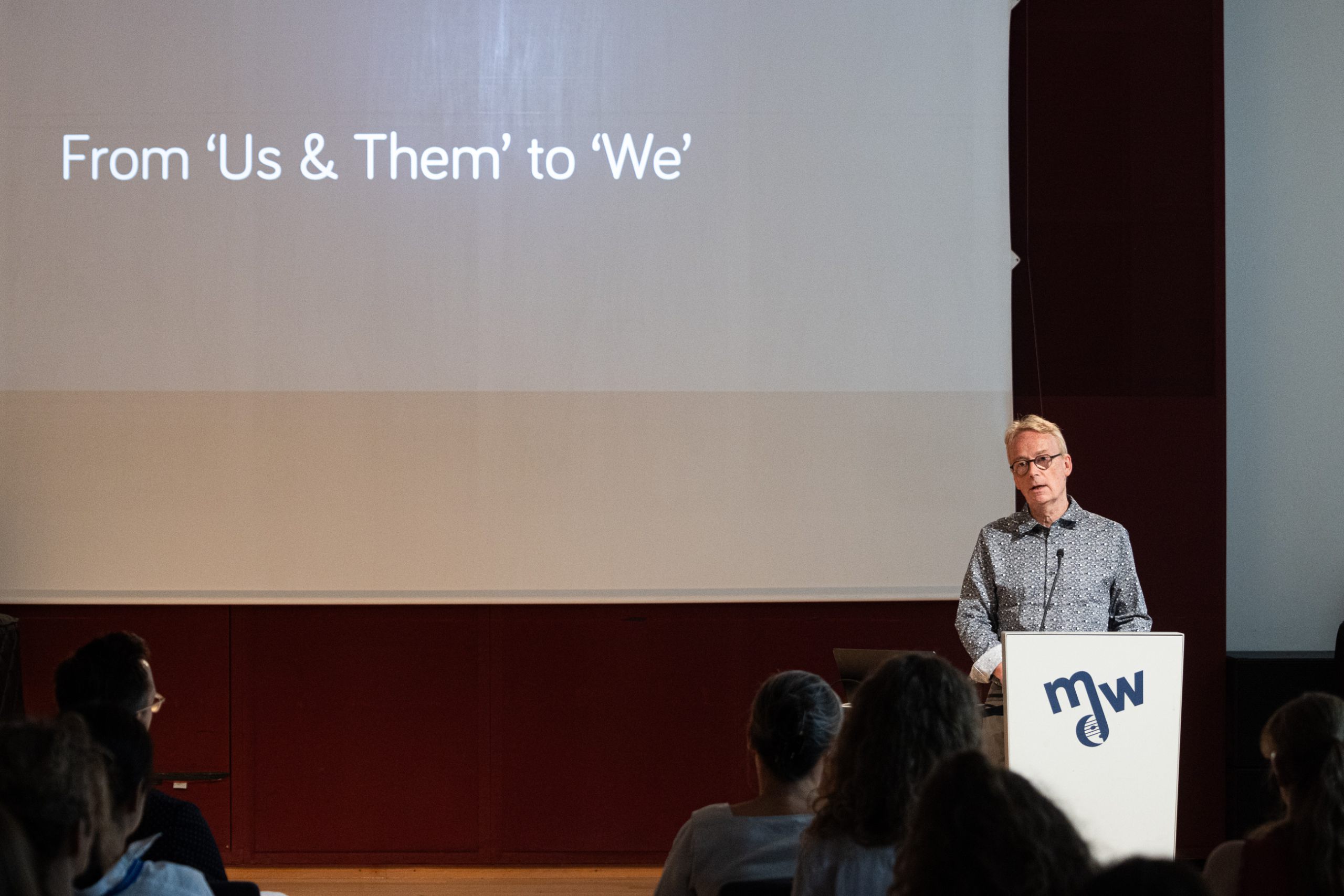
Scene 2 – Liberated Dialogue
Annette Ziegenmeyer and Julia Peters from the University of Music Lübeck participated remotely. In a presentation entitled Change of perspective as a possible starting point for social transformation? Ziegenmeyer and Peters introduced an educational song-writing workshop in which students worked with young people at a juvenile detention centre. They shed light on key aspects such as confronting oneself with other lifeworlds and the discovery of talents among the participating youths. The change of perspective referred to by the presenters arose from the trust formed between the students and the young detainees, from the need to have the latter help shape the workshop sessions and occasionally also lead them as young experts, and from the courage to enter into open processes of transformative learning. The discussion following this presentation saw numerous questions raised—including as to how transformative learning processes might also be employed in places like schools and how dialogue and exchange between all participating institutions might be intensified.
Scene 3 – Found: “Lost Place” As a Cultural Village
On the afternoon of the first conference day, Barbara Balba Weber of the University of the Arts Bern introduced a very personal practical project. The recent pandemic saw her spend half a year in an abandoned village in the Swiss canton of Ticino, where she harnessed her own experiences and vision in cooperation with a group of dedicated music mediators to found a cultural village where Afghan and Swiss young adults were afforded sufficient time and a protected space in which to create culture, make music, tell stories, produce films, and write books together with people their own age. This guided and accompanied project brought forth impressive outcomes and proved how the formation of relationships gives rise to culture. For productive collaboration in a spirit of solidarity, the pristine natural surroundings and remoteness of the chosen location offered near-paradisiacal conditions.
Scene 4 – Othering as a Non-Destination
In her lecture on Othering Mechanisms vs. Empowerment, Cultural Institutions Studies professor Lisa Gaupp of the mdw’s Department of Cultural Management and Gender Studies (IKM) provided a comprehensive look at the state of decolonial research, at how difficult it is to avoid falling back into the many traps that are “othering”, and at the possibility and necessity of exposing exclusionary mechanisms. The follow-up discussion self-critically queried matters such as the representation of musical genres at the mdw and the ways in which the mdw—as a powerful institution of the highest possible societal relevance—might work to achieve greater social permeability and more decolonial structures, such as in connection with admission examinations.
Scene 5 – A Sound that Transforms
Composer and interactive artist Bernhard König’s student workshops, which followed this day’s lectures, were introduced by a “little piece of transformation” embodied by the following words, which were uttered collectively by all those present in a way that resounded throughout the space:
Music, what does it matter – a note is a note – but many notes together – though it may not seem that way – amount to a little piece of transformation.
Working in multiple student-led and -moderated groups, the participants had an opportunity to engage in exchange concerning the psychological effects of the climate crisis, the question of how to go about reaching new target audiences, and a society-wide perspective on transformation to a more climate-just world.
Scene 6 – Poseidon Escape, or: In Search of the Right Way
The conference continued at Brotfabrik Wien, a historic former bread factory in Vienna’s tenth district that is now used as a cultural venue but remains as nourishing as ever. There, Krysztina Winkel of the Vienna State Opera spoke about the rehearsal work and developmental processes of her institution’s “Opera Lab” programme and also provided insights into its latest production, entitled Die Kaugummi-Göttin [The Goddess of Chewing Gum]. Taking Monteverdi’s opera Il ritorno d’Ulisse in patria as their model, 26 young people developed a performance that was set in an escape room and revolved around the topics of “homeland” and “identity”. The subsequent performance of this work convincingly demonstrated the success of this participative process to the conference participants, who shared their impressions with each other afterwards at a dinner prepared by the Cartas project Community Cooking.
Scene 7 – Near-Death Music
Following the second conference day’s musical opening courtesy of the Rubik Quartet, Johannes Meissl introduced the concept behind “Musethica”—a educational programme founded by Avri Levitan and Carmen Marcuello that provides music students with opportunities to gather high-intensity performing experience outside of traditional concert venues. The concerts organised to this end take place at refugee shelters, prisons, hospice facilities, and numerous other venues and locations. With its clear commitment to social engagement, this programme aims to afford access to performances of the highest quality to societal groups that are excluded from traditional concert life. In turn, the perceptions and horizons of the participating musicians are expanded by the experience gained in these special performances. This was attested to by programme participant Janay Tulenova, who described the deep impression she took away from performing at a hospice care facility where a woman who was dying wished to hear a piece by Johann Sebastian Bach as a final musical experience prior to her departure. Playing and giving the gift of music in this light shifted Tulenova’s perspective on her prior performing practices.
Scene 8 – Musicians as “Change Agents”
Maria Westvall, a professor at the Rhythmic Music Conservatory in Copenhagen, spoke in her keynote Artistic Citizenship – Who Gets to Participate? about how “artistic citizenship” can be lived and thereby serve to transform society in actual practice. But if artists and musicians are to be “change agents”, what does this entail for training programmes and for the field’s accessibility and responsibilities? Is the point to declare music responsible for social change? If so, what change do we want? In what direction should it actually go? And who should be allowed to participate, feel addressed, and be targeted? Some questions can and must remain open, but the importance of the relationship entered into by people and musics as part of “musicking” (Christopher Small) and of musical activity’s linkage with processes of social change is undisputed. What remains now and in the future is music as a social practice that bears responsibility for the common good, with all the new challenges and opportunities that this entails.
Scene 9 – Out of the Orchestra Pit and Up Mount Stupid
Thereafter, an in-depth introduction to the ensemble Stehgreif Orchester—an improvising symphony orchestra with a penchant for experimentation—was provided by Immanuel de Gilde and Lorenz Blaumer. The focus here was on the interplay between interpretation, re-composition, improvisation, and staging that typifies this orchestra’s doings. Its active creative work, paired with idealism and social experimentation, has led to formats such as the climate-related KlimaCampWorkshops or a “Change Symphony”—and this work sometimes begins or even ends atop “Mount Stupid”, a place where not knowing just what all can’t work gives rise to considerable productive power. De Gilde and Blaumer spoke with great authenticity about commitment, the effects that courage can have, and the courage to fail—in the process expanding the idea of what might be possible for music mediation in a conceptual sense as well as in actual practice.
Scene 10 –“It’s hard to survive in a jungle if you were trained in a zoo.”
In their lecture Transforming Higher Music Education – Systems Learning through Counternarratives of Finnish Socially Engaged Musicians, Heidi Westerlund and Sari Karttunen of Finland’s Sibelius Academy provided insights from a study. Its research question pertained to how musicians with tertiary-level training reflect upon experienced and learnings acquired through socially engaged work as well as how these might influence traditional pre-professional musical training. The study’s participants noted how good it can be, when pursuing socially relevant music-related work, to come off their high horses for once, to venture out into terrain with less rules, to make oneself available to the most varied social groups as a contact on an equal footing in one’s capacity as a musician, and to become a learner.
Scene 11 – Education over Conceit
Concrete ways in which study findings and practical experiences might inform traditional pre-professional musical training also figured into the subsequent panel discussion on the training situation currently faced by music mediators and musicians: questions posed by Sarah Chaker and Axel Petri-Preis were responded to by Lydia Grün (President, University of Music and Performing Arts Munich), Sean Gregory (Vice-Principal and Director of Innovation and Engagement, Guildhall School of Music & Drama, London), and mdw Rector Ulrike Sych.
The participants engaged in decidedly spirited discussion of topics such as music academies’ and universities’ contributions to a fairer world of greater solidarity, the limits of universities’ and artists’ responsibility, and challenges to the “concept of excellence” particularly in light of artificial intelligence and awareness of one’s own privileged background. Video contributions added the voices of music students from a number of different countries, who provided critical reflections and comments on their current experiences of university-level musical training.
The final part of this conference was rung in—or, better put, plucked and bowed in—by the quanun player Sofia Labropoulou. She presented the song “No Beauty without Freedom” and went on to emphasise both the kanun’s rich tradition and its outstanding qualities as a resonance chamber in the discussion thereafter. Her performance, which featured expanded playing techniques that produced a wide range sounds, made clear the potential of this instrument.
Scene 12 – Creative Drive
In the final round table discussion, entitled Zukunft gestalten (Shaping the Future) and moderated by Axel Petri-Preis and Sarah Chaker, participants Annette Ziegenmeyer (Lübeck Academy of Music), Annemarie Mitterbäck (Music*Scapes), and Sabine Reiter (mica – music austria) addressed the question of what and how music mediation can contribute to the musical life and society of tomorrow. Annemarie Mitterbäck introduced her Viennese association Music*Scapes, an experimental space with frequent new projects that pursue a new, transcultural musical language and put community music initiatives in a position to highlight and criticise power asymmetries.
Sabine Reiter, executive director of mica – music austria, reported on the music mediation scene’s ongoing development from her dual perspective as an observer and protagonist. She provided an overview of music mediation in Austria and described how training and further training had been urgent themes within the community before networking-related aspects came to the fore. One clear success that she mentioned was the fact that mediation projects are now receiving subsidies. Reiter then went on to underline the relevance and potential of community music, co-creation, and music mediation.
Annette Ziegenmeyer recalled how a focus on people had been absent both in her own training and in her degree programme’s subject-specific orientation. She went on to speak of curiosity about the bigger picture, highlighting the importance of community music in her teaching and how she is driven by the question as to school-based music mediation’s social relevance and responsibility. The roundtable discussion concluded with statements from the audience and a general enthusiasm for engaging in impactful music and art mediation.
Scene 13 – Ithaca as a New Starting Point
At the conference’s conclusion, a hearty round of applause thanked Sarah Chaker and Axel Petri-Preis for the work that they had devoted to its conception and conduct. The participants took home with them the impression of a colourful shared journey to deeply inspiring places with innovative ideas, all consistently centred on the possibility and necessity of viewing and perceiving music and music mediation as a source of strength and as a locus of social responsibility and societal change. Ithaca had been reached—but it was simultaneously clear to all that the journey was far from over, indeed beginning ever anew.
Further information:
Turning Social im mdw-Magazin
mdw.ac.at/turningsocial

